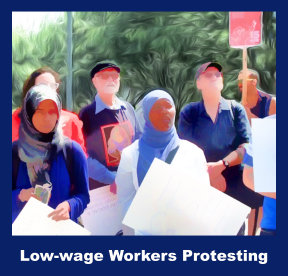 By Max Hyland
By Max Hyland
Wednesday, April 22, 2015
Reprinted from a Facebook Post

******
******
One of the critiques we have heard is that immediately increasing the minimum wage by 58% will have a disastrous effect on the economy. Usually to go along with this complaint is a claim that the minimum wage has never gone up that fast before, which is false.
In 1949 the minimum wage went up by 87.5% all at once, overnight. Just a few years later it went up another 33%, overnight.
The 50s were a period of strong economic growth, explosive economic growth, and unprecedented increases in the distribution of wealth and the prosperity of the American public including businesses.
It’s not 1955, and our circumstances are indeed not the same. But if raising the minimum wage truly were bound to cause the sky to fall, the rivers to run red, and all capital to flee the country- the 1950s would not have been one of the strongest periods of economic growth in our history.
Max H
![]()
Citations:
“In 1949, the minimum wage was raised from 40 cents an hour to 75 cents an hour for all workers and minimum wage coverage was expanded to include workers in the air transport industry… A 1955 amendment increased the minimum wage to $1.00 an hour with no changes in coverage.”
http://www.dol.gov/whd/minwage/coverage.htm
“During the 1950s … The United States was the world’s strongest military power. Its economy was booming, and the fruits of this prosperity–new cars, suburban houses and other consumer goods–were available to more people than ever before.”
http://www.history.com/topics/1950s

The 1950s were a booming time for the US economy because the entire industrialized world, other than the US, was destroyed in WW2. The United States essentially became the bread box and the factory for the rest of the globe. Add to this the demographic situation at home, and there was little that was going to slow down the rapid expansion of the US economy. Your post also fails to point out that the increase in the minimum wage was essentially just keeping up with inflation. Today inflation is sputtering along at 1%. The ability of an economy growing at 1% GDP and 1% inflation to absorb such an increase in labor costs is completely different from an economy growing at 5-7% annually. There were some quarters when the economy grew at 15% or more. The inflation rate in 1946 was 8.3%. 1947 was 14.4%. 1948 was 8.1%. Washington State’s minimum wage is already indexed for inflation. Adjusted for inflation, the federal minimum wage in 1948 was $3.87/hour. The increase raised the inflation adjusted wage to $7.25, the federal minimum wage today. Adjusted for inflation, the minimum wage has never been $15/hour. The peak inflation adjusted wage was $10.61 in 1968. The real wage at that time was $1.60. In short, Washington State’s current minimum wage of $9.47 is greater than the inflation adjusted average in 72 of the past 75 years.
Thank you for your thoughtful reply, I will reiterate the purpose of this article which may have not survived the editing process;
Raising the minimum wage did not harm the boom. The sky did not fall, the world did not end, the boom did not end, the economy did not contract.
This is just one piece of a broad thesis, not by itself a complete proof. There is a specific criticism, that the wage has never been raised so quickly, which is factually untrue. It has been, and it wasn’t terrible.
I see what you’re getting at and want to honor your concern, economic policy is serious business and the consequences of a misstep could be dire. This is not a misstep.
Mr. Kiner:
Please do not confuse people with facts, specifics, research, and common sense. There is no room for that in the 15 Now movement.
JS
Sen. Elizabeth Warren (D-Mass.) made a case for increasing the minimum wage last week during a Senate Committee on Health, Education, Labor and Pensions hearing, in which she cited a study that suggested the federal minimum wage would have stood at nearly $22 an hour today if it had kept up with increased rates in worker productivity.
“If we started in 1960 and we said that as productivity goes up, that is as workers are producing more, then the minimum wage is going to go up the same. And if that were the case then the minimum wage today would be about $22 an hour,” she said, speaking to Dr. Arindrajit Dube, a University of Massachusetts Amherst professor who has studied the economic impacts of minimum wage. “So my question is Mr. Dube, with a minimum wage of $7.25 an hour, what happened to the other $14.75? It sure didn’t go to the worker.”
http://www.huffingtonpost.com/2013/03/18/elizabeth-warren-minimum-wage_n_2900984.html?utm_hp_ref=politics